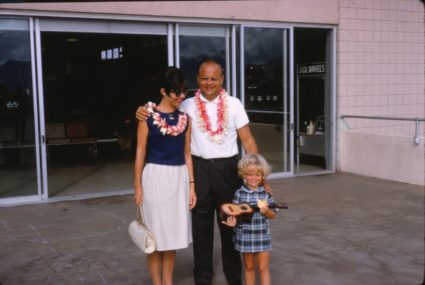Our March 2020 pick for the PBS NewsHour-New York Times book club is Dani Shapiro's "Inheritance." Become a member of the Now Read This book club by joining our Facebook group, or by signing up for our newsletter. Learn more about the book club here.
Below are questions to help guide your discussions as you read the book over the next month. You can also submit your own questions for Dani Shapiro on our Google form. Shapiro will answer reader questions on the PBS NewsHour broadcast at the end of the month.
WARNING: Spoiler alert on questions further down
- Shapiro remembers a family friend and Holocaust survivor, Mrs. Kushner, pointing out her blonde hair when she was a child and telling her, "You could have gotten us bread from the Nazis" because of it. Why do these comments about Shapiro's appearance unnerve her?
- Shapiro tells her students that "there is no such thing as absolute truth — only the truth that is singularly their own." How is her own truth rocked by the results of her ancestry test?
- What clues about her own heritage does Shapiro say she ignored growing up? Do you think she was trying to avoid them?
- When Shapiro consults a rabbi after getting the results of her DNA test, he tells her that the father who raised her was a hero. Why did this comment matter to her so deeply?
- When Shapiro contacts her biological father, he writes in return, "I don't have the time, energy, or interest to pursue this further." What did you make of his response? Should sperm donors be able to expect anonymity?
- How does Shapiro's connection with her spirituality evolve?
- Throughout the memoir, how does Shapiro grapple with the dark history of eugenics, as it relates to fertility science?
- What ethical questions does Shapiro encounter through this experience? What did you make of how she dealt with them?
- Shapiro remembers her mother saying that she "hit the jackpot" by having Dani, "as if it were a lottery." Did finding out she had been conceived using artificial insemination help the author understand her relationship with her mother?
- What does the word "thoughtus" symbolize when it comes to Shapiro's relationship with Ben, her biological father?
- Shapiro writes that her connection to her father Paul has "nothing to do with biology, and everything to do with love." She also writes that donating sperm is "the passing along of an essence that was inseparable from personhood itself." What do you think of the differences she articulates between genetic bonds and those we share with those who raise us?
- How did this memoir make you think about the influences of nature versus nurture?
- Shapiro decides to change her name from Daneile to Dani, and she also gets a symbolic tattoo. What do these changes say about the way her identity shifts throughout the memoir?
- Shapiro writes about how social media has changed the way we interact with our families and connect with our history. In your view, has it changed for the worse or the better?
- Shapiro thinks of these words when reflecting on her experience: "Now there are no more secrets." Has new DNA technology encouraged families to be more open with one another? Have these DNA tests unearthed something unexpected about your own family history?
Support Canvas
Sustain our coverage of culture, arts and literature.

